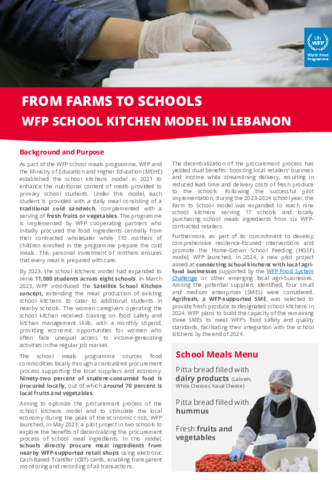
As part of the WFP school meals programme, WFP and the Ministry of Education and Higher Education (MEHE) established the school kitchens model in 2021 to improve the nutritional quality of meals for primary school students. Each student receives a daily meal comprising a traditional cold sandwich and fresh fruits or vegetables. Implemented by WFP cooperating partners, the programme initially procured ingredients centrally from wholesalers, while 110 mothers prepared the meals. By 2023, the model expanded to serve 11,000 students across eight schools, with the introduction of the Satellite School Kitchen concept. The programme sources 92 percent of its food locally, supporting the economy. To optimize procurement and stimulate the local economy, a pilot project decentralized the process in May 2023, allowing schools to purchase ingredients directly from nearby WFP-supported retail shops using electronic Cash-Based Transfer (CBT) cards.
Furthermore, as part of its commitment to develop comprehensive resilience-focused interventions and promote the Home-Grown School Feeding (HGSF) model, WFP launched, in 2024, a new pilot project aimed at connecting school kitchens with local agri-food businesses supported by the WFP Food System Challenge or other emerging local agri-businesses. Among the potential suppliers identified, four small and medium enterprises (SMEs) were considered.
